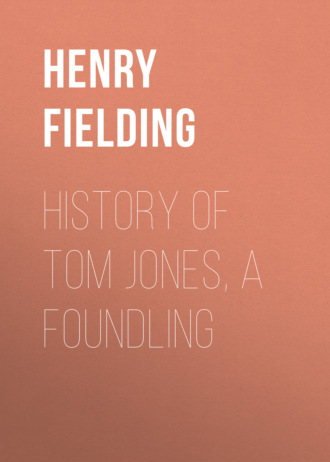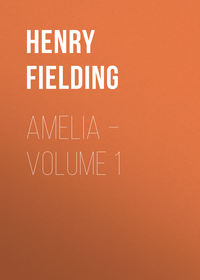 полная версия
полная версияHistory of Tom Jones, a Foundling
All these symptoms escaped the notice of the squire: but not so of Sophia. She soon perceived these agitations of mind in Jones, and was at no loss to discover the cause; for indeed she recognized it in her own breast. And this recognition is, I suppose, that sympathy which hath been so often noted in lovers, and which will sufficiently account for her being so much quicker-sighted than her father.
But, to say the truth, there is a more simple and plain method of accounting for that prodigious superiority of penetration which we must observe in some men over the rest of the human species, and one which will serve not only in the case of lovers, but of all others. From whence is it that the knave is generally so quick-sighted to those symptoms and operations of knavery, which often dupe an honest man of a much better understanding? There surely is no general sympathy among knaves; nor have they, like freemasons, any common sign of communication. In reality, it is only because they have the same thing in their heads, and their thoughts are turned the same way. Thus, that Sophia saw, and that Western did not see, the plain symptoms of love in Jones can be no wonder, when we consider that the idea of love never entered into the head of the father, whereas the daughter, at present, thought of nothing else.
When Sophia was well satisfied of the violent passion which tormented poor Jones, and no less certain that she herself was its object, she had not the least difficulty in discovering the true cause of his present behaviour. This highly endeared him to her, and raised in her mind two of the best affections which any lover can wish to raise in a mistress – these were, esteem and pity – for sure the most outrageously rigid among her sex will excuse her pitying a man whom she saw miserable on her own account; nor can they blame her for esteeming one who visibly, from the most honourable motives, endeavoured to smother a flame in his own bosom, which, like the famous Spartan theft, was preying upon and consuming his very vitals. Thus his backwardness, his shunning her, his coldness, and his silence, were the forwardest, the most diligent, the warmest, and most eloquent advocates; and wrought so violently on her sensible and tender heart, that she soon felt for him all those gentle sensations which are consistent with a virtuous and elevated female mind. In short, all which esteem, gratitude, and pity, can inspire in such towards an agreeable man – indeed, all which the nicest delicacy can allow. In a word, she was in love with him to distraction.
One day this young couple accidentally met in the garden, at the end of the two walks which were both bounded by that canal in which Jones had formerly risqued drowning to retrieve the little bird that Sophia had there lost.
This place had been of late much frequented by Sophia. Here she used to ruminate, with a mixture of pain and pleasure, on an incident which, however trifling in itself, had possibly sown the first seeds of that affection which was now arrived to such maturity in her heart.
Here then this young couple met. They were almost close together before either of them knew anything of the other’s approach. A bystander would have discovered sufficient marks of confusion in the countenance of each; but they felt too much themselves to make any observation. As soon as Jones had a little recovered his first surprize, he accosted the young lady with some of the ordinary forms of salutation, which she in the same manner returned; and their conversation began, as usual, on the delicious beauty of the morning. Hence they past to the beauty of the place, on which Jones launched forth very high encomiums. When they came to the tree whence he had formerly tumbled into the canal, Sophia could not help reminding him of that accident, and said, “I fancy, Mr Jones, you have some little shuddering when you see that water.” – “I assure you, madam,” answered Jones, “the concern you felt at the loss of your little bird will always appear to me the highest circumstance in that adventure. Poor little Tommy! there is the branch he stood upon. How could the little wretch have the folly to fly away from that state of happiness in which I had the honour to place him? His fate was a just punishment for his ingratitude.” – “Upon my word, Mr Jones,” said she, “your gallantry very narrowly escaped as severe a fate. Sure the remembrance must affect you.” – “Indeed, madam,” answered he, “if I have any reason to reflect with sorrow on it, it is, perhaps, that the water had not been a little deeper, by which I might have escaped many bitter heart-aches that Fortune seems to have in store for me.” – “Fie, Mr Jones!” replied Sophia; “I am sure you cannot be in earnest now. This affected contempt of life is only an excess of your complacence to me. You would endeavour to lessen the obligation of having twice ventured it for my sake. Beware the third time.” She spoke these last words with a smile, and a softness inexpressible. Jones answered with a sigh, “He feared it was already too late for caution:” and then looking tenderly and stedfastly on her, he cried, “Oh, Miss Western! can you desire me to live? Can you wish me so ill?” Sophia, looking down on the ground, answered with some hesitation, “Indeed, Mr Jones, I do not wish you ill.” – “Oh, I know too well that heavenly temper,” cries Jones, “that divine goodness, which is beyond every other charm.” – “Nay, now,” answered she, “I understand you not. I can stay no longer.” – “I – I would not be understood!” cries he; “nay, I can’t be understood. I know not what I say. Meeting you here so unexpectedly, I have been unguarded: for Heaven’s sake pardon me, if I have said anything to offend you. I did not mean it. Indeed, I would rather have died – nay, the very thought would kill me.” – “You surprize me,” answered she. “How can you possibly think you have offended me?” – “Fear, madam,” says he, “easily runs into madness; and there is no degree of fear like that which I feel of offending you. How can I speak then? Nay, don’t look angrily at me: one frown will destroy me. I mean nothing. Blame my eyes, or blame those beauties. What am I saying? Pardon me if I have said too much. My heart overflowed. I have struggled with my love to the utmost, and have endeavoured to conceal a fever which preys on my vitals, and will, I hope, soon make it impossible for me ever to offend you more.”
Mr Jones now fell a trembling as if he had been shaken with the fit of an ague. Sophia, who was in a situation not very different from his, answered in these words: “Mr Jones, I will not affect to misunderstand you; indeed, I understand you too well; but, for Heaven’s sake, if you have any affection for me, let me make the best of my way into the house. I wish I may be able to support myself thither.”
Jones, who was hardly able to support himself, offered her his arm, which she condescended to accept, but begged he would not mention a word more to her of this nature at present. He promised he would not; insisting only on her forgiveness of what love, without the leave of his will, had forced from him: this, she told him, he knew how to obtain by his future behaviour; and thus this young pair tottered and trembled along, the lover not once daring to squeeze the hand of his mistress, though it was locked in his.
Sophia immediately retired to her chamber, where Mrs Honour and the hartshorn were summoned to her assistance. As to poor Jones, the only relief to his distempered mind was an unwelcome piece of news, which, as it opens a scene of different nature from those in which the reader hath lately been conversant, will be communicated to him in the next chapter.
Chapter vii. – In which Mr Allworthy appears on a sick-bed
Mr Western was become so fond of Jones that he was unwilling to part with him, though his arm had been long since cured; and Jones, either from the love of sport, or from some other reason, was easily persuaded to continue at his house, which he did sometimes for a fortnight together without paying a single visit at Mr Allworthy’s; nay, without ever hearing from thence.
Mr Allworthy had been for some days indisposed with a cold, which had been attended with a little fever. This he had, however, neglected; as it was usual with him to do all manner of disorders which did not confine him to his bed, or prevent his several faculties from performing their ordinary functions; – a conduct which we would by no means be thought to approve or recommend to imitation; for surely the gentlemen of the Aesculapian art are in the right in advising, that the moment the disease has entered at one door, the physician should be introduced at the other: what else is meant by that old adage, Venienti occurrite morbo? “Oppose a distemper at its first approach.” Thus the doctor and the disease meet in fair and equal conflict; whereas, by giving time to the latter, we often suffer him to fortify and entrench himself, like a French army; so that the learned gentleman finds it very difficult, and sometimes impossible, to come at the enemy. Nay, sometimes by gaining time the disease applies to the French military politics, and corrupts nature over to his side, and then all the powers of physic must arrive too late. Agreeable to these observations was, I remember, the complaint of the great Doctor Misaubin, who used very pathetically to lament the late applications which were made to his skill, saying, “Bygar, me believe my pation take me for de undertaker, for dey never send for me till de physicion have kill dem.”
Mr Allworthy’s distemper, by means of this neglect, gained such ground, that, when the increase of his fever obliged him to send for assistance, the doctor at his first arrival shook his head, wished he had been sent for sooner, and intimated that he thought him in very imminent danger. Mr Allworthy, who had settled all his affairs in this world, and was as well prepared as it is possible for human nature to be for the other, received this information with the utmost calmness and unconcern. He could, indeed, whenever he laid himself down to rest, say with Cato in the tragical poem —
Let guilt or fearDisturb man’s rest: Cato knows neither of them;Indifferent in his choice to sleep or die.In reality, he could say this with ten times more reason and confidence than Cato, or any other proud fellow among the antient or modern heroes; for he was not only devoid of fear, but might be considered as a faithful labourer, when at the end of harvest he is summoned to receive his reward at the hands of a bountiful master.
The good man gave immediate orders for all his family to be summoned round him. None of these were then abroad, but Mrs Blifil, who had been some time in London, and Mr Jones, whom the reader hath just parted from at Mr Western’s, and who received this summons just as Sophia had left him.
The news of Mr Allworthy’s danger (for the servant told him he was dying) drove all thoughts of love out of his head. He hurried instantly into the chariot which was sent for him, and ordered the coachman to drive with all imaginable haste; nor did the idea of Sophia, I believe, once occur to him on the way.
And now the whole family, namely, Mr Blifil, Mr Jones, Mr Thwackum, Mr Square, and some of the servants (for such were Mr Allworthy’s orders) being all assembled round his bed, the good man sat up in it, and was beginning to speak, when Blifil fell to blubbering, and began to express very loud and bitter lamentations. Upon this Mr Allworthy shook him by the hand, and said, “Do not sorrow thus, my dear nephew, at the most ordinary of all human occurrences. When misfortunes befal our friends we are justly grieved; for those are accidents which might often have been avoided, and which may seem to render the lot of one man more peculiarly unhappy than that of others; but death is certainly unavoidable, and is that common lot in which alone the fortunes of all men agree: nor is the time when this happens to us very material. If the wisest of men hath compared life to a span, surely we may be allowed to consider it as a day. It is my fate to leave it in the evening; but those who are taken away earlier have only lost a few hours, at the best little worth lamenting, and much oftener hours of labour and fatigue, of pain and sorrow. One of the Roman poets, I remember, likens our leaving life to our departure from a feast; – a thought which hath often occurred to me when I have seen men struggling to protract an entertainment, and to enjoy the company of their friends a few moments longer. Alas! how short is the most protracted of such enjoyments! how immaterial the difference between him who retires the soonest, and him who stays the latest! This is seeing life in the best view, and this unwillingness to quit our friends is the most amiable motive from which we can derive the fear of death; and yet the longest enjoyment which we can hope for of this kind is of so trivial a duration, that it is to a wise man truly contemptible. Few men, I own, think in this manner; for, indeed, few men think of death till they are in its jaws. However gigantic and terrible an object this may appear when it approaches them, they are nevertheless incapable of seeing it at any distance; nay, though they have been ever so much alarmed and frightened when they have apprehended themselves in danger of dying, they are no sooner cleared from this apprehension than even the fears of it are erased from their minds. But, alas! he who escapes from death is not pardoned; he is only reprieved, and reprieved to a short day.
“Grieve, therefore, no more, my dear child, on this occasion: an event which may happen every hour; which every element, nay, almost every particle of matter that surrounds us is capable of producing, and which must and will most unavoidably reach us all at last, ought neither to occasion our surprize nor our lamentation.
“My physician having acquainted me (which I take very kindly of him) that I am in danger of leaving you all very shortly, I have determined to say a few words to you at this our parting, before my distemper, which I find grows very fast upon me, puts it out of my power.
“But I shall waste my strength too much. I intended to speak concerning my will, which, though I have settled long ago, I think proper to mention such heads of it as concern any of you, that I may have the comfort of perceiving you are all satisfied with the provision I have there made for you.
“Nephew Blifil, I leave you the heir to my whole estate, except only £500 a-year, which is to revert to you after the death of your mother, and except one other estate of £500 a-year, and the sum of £6000, which I have bestowed in the following manner:
“The estate of £500 a-year I have given to you, Mr Jones: and as I know the inconvenience which attends the want of ready money, I have added £1000 in specie. In this I know not whether I have exceeded or fallen short of your expectation. Perhaps you will think I have given you too little, and the world will be as ready to condemn me for giving you too much; but the latter censure I despise; and as to the former, unless you should entertain that common error which I have often heard in my life pleaded as an excuse for a total want of charity, namely, that instead of raising gratitude by voluntary acts of bounty, we are apt to raise demands, which of all others are the most boundless and most difficult to satisfy. – Pardon me the bare mention of this; I will not suspect any such thing.”
Jones flung himself at his benefactor’s feet, and taking eagerly hold of his hand, assured him his goodness to him, both now and all other times, had so infinitely exceeded not only his merit but his hopes, that no words could express his sense of it. “And I assure you, sir,” said he, “your present generosity hath left me no other concern than for the present melancholy occasion. Oh, my friend, my father!” Here his words choaked him, and he turned away to hide a tear which was starting from his eyes.
Allworthy then gently squeezed his hand, and proceeded thus: “I am convinced, my child, that you have much goodness, generosity, and honour, in your temper: if you will add prudence and religion to these, you must be happy; for the three former qualities, I admit, make you worthy of happiness, but they are the latter only which will put you in possession of it.
“One thousand pound I have given to you, Mr Thwackum; a sum I am convinced which greatly exceeds your desires, as well as your wants. However, you will receive it as a memorial of my friendship; and whatever superfluities may redound to you, that piety which you so rigidly maintain will instruct you how to dispose of them.
“A like sum, Mr Square, I have bequeathed to you. This, I hope, will enable you to pursue your profession with better success than hitherto. I have often observed with concern, that distress is more apt to excite contempt than commiseration, especially among men of business, with whom poverty is understood to indicate want of ability. But the little I have been able to leave you will extricate you from those difficulties with which you have formerly struggled; and then I doubt not but you will meet with sufficient prosperity to supply what a man of your philosophical temper will require.
“I find myself growing faint, so I shall refer you to my will for my disposition of the residue. My servants will there find some tokens to remember me by; and there are a few charities which, I trust, my executors will see faithfully performed. Bless you all. I am setting out a little before you.” —
Here a footman came hastily into the room, and said there was an attorney from Salisbury who had a particular message, which he said he must communicate to Mr Allworthy himself: that he seemed in a violent hurry, and protested he had so much business to do, that, if he could cut himself into four quarters, all would not be sufficient.
“Go, child,” said Allworthy to Blifil, “see what the gentleman wants. I am not able to do any business now, nor can he have any with me, in which you are not at present more concerned than myself. Besides, I really am – I am incapable of seeing any one at present, or of any longer attention.” He then saluted them all, saying, perhaps he should be able to see them again, but he should be now glad to compose himself a little, finding that he had too much exhausted his spirits in discourse.
Some of the company shed tears at their parting; and even the philosopher Square wiped his eyes, albeit unused to the melting mood. As to Mrs Wilkins, she dropt her pearls as fast as the Arabian trees their medicinal gums; for this was a ceremonial which that gentlewoman never omitted on a proper occasion.
After this Mr Allworthy again laid himself down on his pillow, and endeavoured to compose himself to rest.
Chapter viii. – Containing matter rather natural than pleasing
Besides grief for her master, there was another source for that briny stream which so plentifully rose above the two mountainous cheek-bones of the housekeeper. She was no sooner retired, than she began to mutter to herself in the following pleasant strain: “Sure master might have made some difference, methinks, between me and the other servants. I suppose he hath left me mourning; but, i’fackins! if that be all, the devil shall wear it for him, for me. I’d have his worship know I am no beggar. I have saved five hundred pound in his service, and after all to be used in this manner. – It is a fine encouragement to servants to be honest; and to be sure, if I have taken a little something now and then, others have taken ten times as much; and now we are all put in a lump together. If so be that it be so, the legacy may go to the devil with him that gave it. No, I won’t give it up neither, because that will please some folks. No, I’ll buy the gayest gown I can get, and dance over the old curmudgeon’s grave in it. This is my reward for taking his part so often, when all the country have cried shame of him, for breeding up his bastard in that manner; but he is going now where he must pay for all. It would have become him better to have repented of his sins on his deathbed, than to glory in them, and give away his estate out of his own family to a misbegotten child. Found in his bed, forsooth! a pretty story! ay, ay, those that hide know where to find. Lord forgive him! I warrant he hath many more bastards to answer for, if the truth was known. One comfort is, they will all be known where he is a going now. – `The servants will find some token to remember me by.’ Those were the very words; I shall never forget them, if I was to live a thousand years. Ay, ay, I shall remember you for huddling me among the servants. One would have thought he might have mentioned my name as well as that of Square; but he is a gentleman forsooth, though he had not cloths on his back when he came hither first. Marry come up with such gentlemen! though he hath lived here this many years, I don’t believe there is arrow a servant in the house ever saw the colour of his money. The devil shall wait upon such a gentleman for me.” Much more of the like kind she muttered to herself; but this taste shall suffice to the reader.
Neither Thwackum nor Square were much better satisfied with their legacies. Though they breathed not their resentment so loud, yet from the discontent which appeared in their countenances, as well as from the following dialogue, we collect that no great pleasure reigned in their minds.
About an hour after they had left the sick-room, Square met Thwackum in the hall and accosted him thus: “Well, sir, have you heard any news of your friend since we parted from him?” – “If you mean Mr Allworthy,” answered Thwackum, “I think you might rather give him the appellation of your friend; for he seems to me to have deserved that title.” – “The title is as good on your side,” replied Square, “for his bounty, such as it is, hath been equal to both.” – “I should not have mentioned it first,” cries Thwackum, “but since you begin, I must inform you I am of a different opinion. There is a wide distinction between voluntary favours and rewards. The duty I have done in his family, and the care I have taken in the education of his two boys, are services for which some men might have expected a greater return. I would not have you imagine I am therefore dissatisfied; for St Paul hath taught me to be content with the little I have. Had the modicum been less, I should have known my duty. But though the Scriptures obliges me to remain contented, it doth not enjoin me to shut my eyes to my own merit, nor restrain me from seeing when I am injured by an unjust comparison.” – “Since you provoke me,” returned Square, “that injury is done to me; nor did I ever imagine Mr Allworthy had held my friendship so light, as to put me in balance with one who received his wages. I know to what it is owing; it proceeds from those narrow principles which you have been so long endeavouring to infuse into him, in contempt of everything which is great and noble. The beauty and loveliness of friendship is too strong for dim eyes, nor can it be perceived by any other medium than that unerring rule of right, which you have so often endeavoured to ridicule, that you have perverted your friend’s understanding.” – “I wish,” cries Thwackum, in a rage, “I wish, for the sake of his soul, your damnable doctrines have not perverted his faith. It is to this I impute his present behaviour, so unbecoming a Christian. Who but an atheist could think of leaving the world without having first made up his account? without confessing his sins, and receiving that absolution which he knew he had one in the house duly authorized to give him? He will feel the want of these necessaries when it is too late, when he is arrived at that place where there is wailing and gnashing of teeth. It is then he will find in what mighty stead that heathen goddess, that virtue, which you and all other deists of the age adore, will stand him. He will then summon his priest, when there is none to be found, and will lament the want of that absolution, without which no sinner can be safe.” – “If it be so material,” says Square, “why don’t you present it him of your own accord?” “It hath no virtue,” cries Thwackum, “but to those who have sufficient grace to require it. But why do I talk thus to a heathen and an unbeliever? It is you that taught him this lesson, for which you have been well rewarded in this world, as I doubt not your disciple will soon be in the other.” – “I know not what you mean by reward,” said Square; “but if you hint at that pitiful memorial of our friendship, which he hath thought fit to bequeath me, I despise it; and nothing but the unfortunate situation of my circumstances should prevail on me to accept it.”









